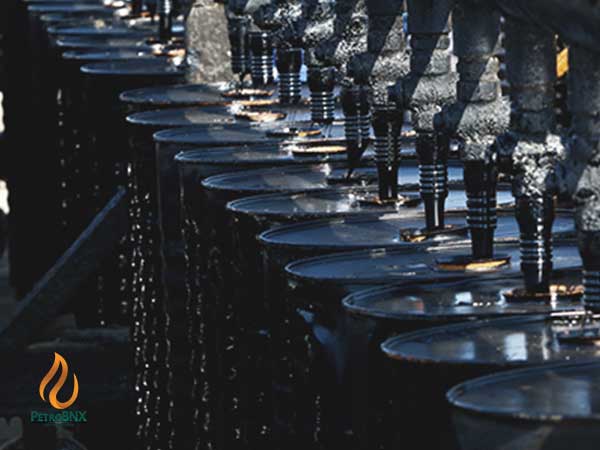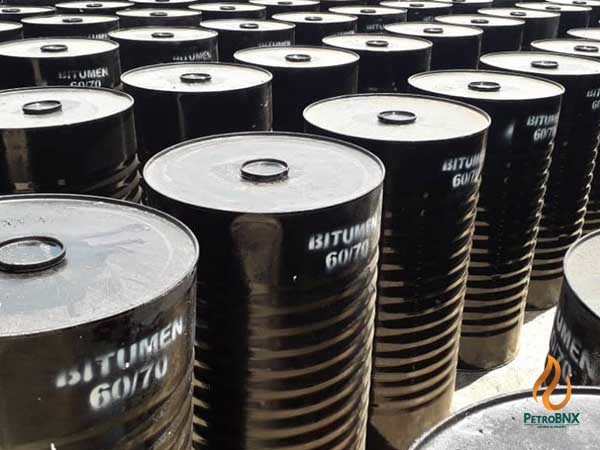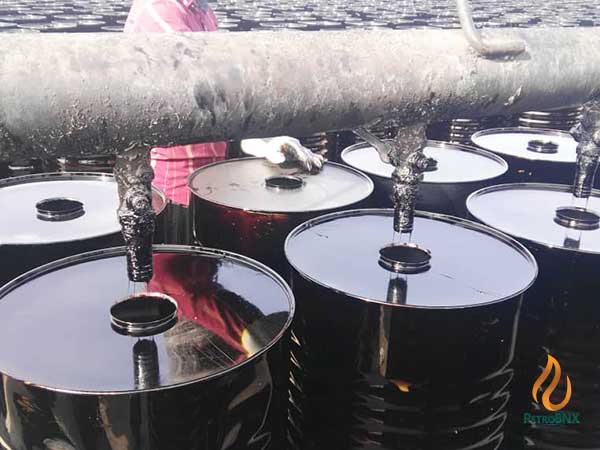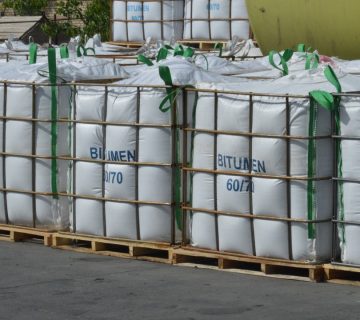What is Penetration Grade Bitumen?
Penetration grade bitumen is a type of refined bitumen produced with varying levels of viscosity. Its name derives from the penetration test, a method used to determine the bitumen’s hardness. This test involves measuring how deeply a standard needle penetrates the bitumen under specific conditions.
The penetration grade of bitumen typically ranges from 15 to 450, but the most common grades used in road construction fall within the 25 to 200 range. These grades are achieved through precise control of the distillation process. Additionally, partial adjustment by fluxing the residual bitumen with specific oils can fine-tune its hardness to meet desired standards.
Applications of Penetration Grade Bitumen

Penetration bitumen is widely used in:
- Road construction: Its varying grades allow for optimal performance in different climates and traffic conditions.
- Paving and surfacing: It provides a durable and weather-resistant surface for roads, highways, and runways.
- Industrial applications: It serves as a key component in the manufacturing of waterproofing materials and sealants.
At PetroBNX, we offer a wide range of penetration grade bitumen tailored to meet your specific project requirements. With our commitment to quality, you can ensure reliable performance and durability for your applications.
For more information or to place an order, contact PetroBNX, your trusted partner in bitumen supply and export.
Comprehensive Guide to Penetration Grade Bitumen

Penetration and Softening Point Standards
Penetration grade bitumen is categorized using standardized tests like BS EN 1426 and BS EN 1427, which measure penetration and softening point values, respectively. These standards help identify the equiviscosity and hardness of various bitumen grades, as shown in the penetration value table.
For example, a bitumen grade of 40/60 signifies a penetration value of 50 ± 10. Additionally, the BS EN 13303 standard defines the limits for loss on heating, ensuring minimal volatile components, which might otherwise affect the bitumen’s performance during preparation or application. The BS EN 12592 standard specifies solubility values, ensuring minimal impurities in the material.
Applications of Penetration Grade Bitumen
Penetration grade bitumen is a widely-used paving grade bitumen, essential for road construction and the production of asphalt pavements with superior properties. Its unique ability to bind aggregates ensures cohesion and stability in the bituminous mix.
This grade of bitumen is primarily utilized in:
- Manufacturing hot mix asphalt for base layers and wearing courses.
- Road surfacing projects, especially in regions with varied climate conditions.
- Industrial applications requiring durable, thermoplastic material.
Manufacturing and Thermoplastic Properties
At PetroBNX, we supply penetration grade bitumen manufactured from the fractional and vacuum distillation of crude oil. The final product, derived from vacuum residue (short residue), is petroleum-grade bitumen designed to meet the highest industry standards.
Penetration grade bitumen is characterized by its thermoplastic behavior, softening at high temperatures and hardening at lower ones. This temperature-viscosity relationship is crucial for determining performance parameters like:
- Adhesion to aggregates.
- Durability under various environmental conditions.
- Application temperatures for optimal results.

Key Features and Testing of Penetration Grade Bitumen
- Penetration Depth: Measured using a needle (100 g) at 25°C for 5 seconds, with results expressed in tenths of a millimeter.
- Flashpoint Temperature: Ensures safety during handling and application.
- Ductility: Indicates flexibility at 25°C.
- Solubility in Trichloroethylene: Confirms the absence of impurities.
- Thin Film Oven Test: Assesses short-term aging effects during mixing with hot aggregate.
Popular Grades: 60/70 and Beyond
The most commonly used penetration grade bitumen is 60/70, favored for its versatility and durability across various climates.
- Soft bitumen (higher penetration values) is ideal for cold climates, offering greater flexibility.
- Hard bitumen (lower penetration values) suits warm climates, providing enhanced stability.
Manufacturing Process and Classification
Penetration grade bitumen is typically obtained through fractional distillation, where crude oil vapors are separated based on density. The resulting bitumen is classified by its hardness, determined by the penetration test. This involves measuring how far a needle penetrates the bitumen sample under specific conditions of temperature and pressure.
The grades range from 15 pen (hardest) to 450 pen (softest). This classification system allows engineers to select the appropriate grade for specific construction or industrial applications.
Why Choose PetroBNX?
At PetroBNX, we specialize in providing high-quality penetration grade bitumen tailored to meet diverse project needs. With strict adherence to international standards, our bitumen ensures superior performance, durability, and reliability in all applications.
For more details or to place an order, reach out to PetroBNX, your trusted partner in the supply and export of premium bitumen products.
Penetration Grade Bitumen: Properties, Tests, and Applications

Penetration grade bitumen is not only a primary binder for road construction but also the foundation for various other road binders, including cutbacks, emulsions, and polymer-modified binders. It is primarily specified by its needle penetration value, also known as “pen.”
- Soft bitumens have high pen numbers, indicating greater flexibility.
- Hard bitumens have low pen numbers, signifying higher rigidity.
However, the specifications extend beyond penetration to include criteria such as softening point, solubility, and resistance to hardening. These ensure performance reliability across diverse applications.
Penetration Test
The penetration test measures the hardness of bitumen under controlled conditions:
- Standard conditions: 25°C, load of 100g, duration of 5 seconds.
- For low-temperature bitumen: 5°C, load of 200g, duration of 60 seconds.
The depth of penetration by the needle into the bitumen is expressed in tenths of a millimeter (dmm). For instance, 200 pen bitumen has a penetration of 200 dmm at 25°C.
Softening Point Test
This test determines the temperature at which bitumen transitions from a solid to a semi-liquid state.
- A standard metal ball is placed on a bitumen disc.
- The temperature at which the bitumen disc can no longer support the ball is recorded as the softening point.
At the softening point, all unmodified bitumens have similar penetration (800 dmm) and viscosity (1200 Pas).
The softening point also provides insight into the temperature susceptibility of bitumen. The Penetration Index (PI), calculated using equations by Pfeiffer and Van Doormal, indicates the sensitivity of bitumen properties to temperature changes. Higher PI values signify greater temperature susceptibility.
Advantages of Penetration Grade Bitumen
- Practical Testing Conditions: Conducted at 25°C (77°F), approximating typical pavement temperatures.
- Low-Temperature Insights: Provides better correlation with low-temperature binder properties compared to viscosity tests.
- Temperature Susceptibility Assessment: Testing at different temperatures reveals how rheology changes with temperature.
- Efficiency: The test is quick, inexpensive, and suitable for field applications.

Disadvantages of Penetration Grade Bitumen
- Empirical Nature: The test does not measure fundamental engineering properties like viscosity.
- Variable Shear Rate: Non-Newtonian behavior at 25°C can influence results.
- Limited Temperature Insights: A single test at 25°C is insufficient to fully determine temperature susceptibility.
- Mixing and Compaction Temperatures: The test does not provide data for these critical parameters.
Applications of Penetration Grade Bitumen
Penetration grade bitumen forms the backbone of asphalt pavements and road construction materials. Its flexibility and temperature-specific grades make it ideal for:
- Hot and cold climates: Soft bitumens for colder regions and hard bitumens for warmer regions.
- High-performance road binders: As a key component in asphalt mixes for roads, highways, and runways.
Introduction to Types of Bitumen: Performance Grade, Penetration Grade, and Viscosity Grade Bitumen
Bitumen is categorized into different types based on its characteristics and applications. Performance Grade Bitumen is designed according to its physical and performance properties at various temperatures and is used in critical projects, such as asphalt paving in hot or cold regions. Penetration Grade Bitumen refers to the hardness or softness of the bitumen and is graded based on penetration testing. This type of bitumen is commonly used in road construction and repair projects. Finally, Viscosity Grade Bitumen is graded based on its viscosity or thickness at different temperatures and is suitable for projects that require a specific flowability property.
Why Choose PetroBNX for Penetration Grade Bitumen?
At PetroBNX, we offer high-quality penetration grade bitumen that meets international standards. Our bitumen undergoes rigorous testing, including penetration and softening point evaluations, ensuring it performs reliably under various conditions.
Whether you need bitumen for road construction, asphalt production, or specialty applications, PetroBNX delivers products tailored to your specific requirements.
For more information or inquiries, contact PetroBNX, your trusted partner in bitumen supply and export.





No comment